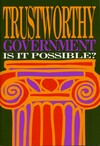

Are you sure?
This bookmark will be removed from all folders and any saved notes will be permanently removed.
Can we stop the erosion of trust?
Last fall, writing in The Washington Post, Richard Harwood spoke of a particularly debilitating contagion that he saw spreading in the United States. It wasn't a new disease or virus. Rather it was a "plague of disbelief"—of confusion and doubt. He contends that no knowledge or facts seem certain any longer. Harwood pointed out how this not only can harm people's daily lives but also can cripple our political processes. For example, people in confusion are more likely to be fearful about all sorts of supposed health risks—from the food they eat, to the automobiles they drive, to the potentially harmful substances in their homes, schools, and workplaces. Struggling with doubt and cynicism, only one third of the eligible voters actually went to the polls in the last general election. And plagued with uncertainty and disbelief, people have lost trust in the institutions that traditionally have provided a measure of stability and order to society.
As a newspaperman, Harwood makes the bluntly honest assessment "The contagion of doubt and confusion is spread—inadvertently in most cases—by the media." The press, of course, can't solve the problem on its own, but Harwood does point to something substantial the media can do. He talks about things like exercising more discrimination in what is published and giving more careful scrutiny to what the experts in various fields put forward as important knowledge or as "fact." Finally he calls for considering whether there should be a new view of the media's reason for existing. What does the press really hope to accomplish? "Is it our purpose," Harwood asks, "to assist in making the world somewhat more knowable or is it to make a different world?" ("The Contagion of Doubt and Confusion," Nov. 26, 1994)
Undoubtedly, helping "to make a different world" is a central reason why The Christian Science Monitor was established as an international daily newspaper in 1908. One of the purposes was stated by its founder, Mary Baker Eddy, when she required that this newspaper accept the ongoing challenge "to injure no man, but to bless all mankind" (The First Church of Christ, Scientist, and Miscellany, p. 353).
Enjoy 1 free Sentinel article or audio program each month, including content from 1898 to today.
JSH Collections
This article is included in:
1996 - PAMPHLET
Trustworthy government: is it possible?
JSH-Online has hundreds of pamphlets, anthologies, and special editions for you to discover.

July 24, 1995 issue
View Issue-
An Australian nurse speaks
by Kim Shippey
-
Is healing really in accord with law?
Georganne T. Bartow-Clark
-
Claiming our dominion over evil
Robert A. Charbeneau
-
Dear Sentinel
with contributions from Kendall Thirlwell, Alex Evers
-
True self-preservation
Maja Joanna Geck
-
Don't react
Harriette Meldrim Hill
-
Wake up! Wake up!
Dorothy Edith Drummond
-
Can we stop the erosion of trust?
William E. Moody
-
The brothers of Genesis
Mary Metzner Trammell
-
In 1972 I was healed of acute malaria through prayer
John Leonard with contributions from Jean B. Leonard
-
Since I am very active in sports and have been in gymnastics...
Amber Jenkins with contributions from Cathy Skeen


